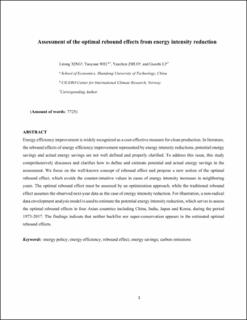Assessment of the optimal rebound effects from energy intensity reduction
Journal article, Peer reviewed
Accepted version

Åpne
Permanent lenke
https://hdl.handle.net/11250/2767726Utgivelsesdato
2020Metadata
Vis full innførselSamlinger
- Journal articles [478]
Sammendrag
Energy efficiency improvement is widely recognized as a cost-effective measure for clean production. In literature, the rebound effects of energy efficiency improvement represented by energy intensity reductions, potential energy savings and actual energy savings are not well defined and properly clarified. To address this issue, this study comprehensively discusses and clarifies how to define and estimate potential and actual energy savings in the assessment. We focus on the well-known concept of rebound effect and propose a new notion of the optimal rebound effect, which avoids the counter-intuitive values in cases of energy intensity increases in neighboring years. The optimal rebound effect must be assessed by an optimization approach, while the traditional rebound effect assumes the observed next-year data as the case of energy intensity reduction. For illustration, a non-radical data envelopment analysis model is used to estimate the potential energy intensity reduction, which serves to assess the optimal rebound effects in four Asian countries including China, India, Japan and Korea, during the period 1973–2017. The findings indicate that neither backfire nor super-conservation appears in the estimated optimal rebound effects.